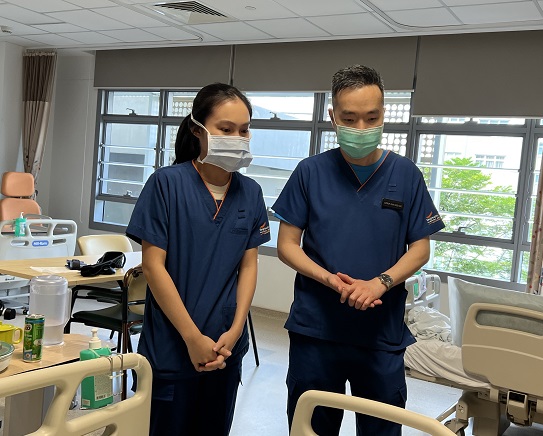Whenever I share that
I work at SingHealth
Community Hospitals
(SCH) with people
I meet, they often
respond, “Oh, you’re
working in a step-down care facility.”
Let me put this in perspective. A
step-down care institution provides an
intermediate level of care between a higher
acuity facility (e.g. a general hospital) and
care in the community (e.g. general
practitioners
(GPs)). By the
time patients
are transferred to a
community hospital,
they are more stable
medically and require less
resources, hence care is also more affordable. SCH manages patients with
a spectrum of needs, ranging from sub-acute
medical conditions and dementia to those
requiring rehabilitative and palliative care.
While this is conventionally perceived to
be step-down care, it gives the unintended
impression that care at a community hospital
equates to slow medicine, slow nursing and slow
rehabilitation. At SCH, this is far from true.
A holistic care plan
During patients’ recovery and rehabilitation
journey, there are appropriate care partners
that step up care at every point.

Take Mr Tan (not his real name), for
example, who sustained a hip fracture. As
he requires surgery, an acute hospital is
the appropriate care partner to deliver this
intervention. Post-surgery, early mobilisation
and intensive rehabilitation are key to reduce
de-conditioning and restore functional
mobility, and the appropriate care partner
now changes to SCH. The SCH care team
works with Mr Tan to achieve his health
goals so that he is able to walk independently
again and resume everyday activities, such as
meeting his friends at the kopitiam.
While in SCH, Mr Tan can participate in
social prescribing activities curated by our
Well-being Coordinators. Social prescribing,
as opposed to prescribing medications, is an
approach that connects people to activities,
groups and services in their community to meet the practical, social and emotional
needs that affect their health and well-being1.
By doing so, SCH steps up care beyond just
addressing the medical needs of our patients
to encompass health-social integrative care.
Upon Mr Tan’s discharge from the
community hospital, his care is transferred
to community providers like his family
physician, community nurses and social
care partners, who will continue to keep
him in good health, with the aim to reduce
readmissions to the hospital.
From Mr Tan’s health journey, we see
that there is a stepping up of care at every
stage, including at the community hospital.
‘Step-down care’ therefore can be misleading;
in my opinion, ‘continuing care’ more aptly
describes the care delivered by SCH’s doctors,
nurses and allied health professionals.
SCH is unique because it is the nexus
between acute hospitals and the community.
Our name includes both ‘hospital’ and
‘community’. Our raison d’etre is therefore
inextricably tied to caring for patients who
often have complex medical and social needs,
optimising their well-being and successfully
transitioning them back home and into the
community. This is a tall order, but one that
challenges, motivates and reinvigorates the
SCH team every day.
En route to a
healthier Singapore
Against the backdrop of a rapidly ageing
population, SCH is preparing to be community
hospitals of the future (CHoF). We envisage
CHoF to enable direct patient admissions from
the community, such as through GPs, instead
of requiring patients to be first admitted to the
acute hospital. With a highly skilled healthcare
team, CHoF will also be able to manage
patients with higher complexity sub-acute
conditions, thus freeing up acute hospital
beds for those with serious medical ailments.
Technology, such as tele-rehabilitation and
tele-monitoring, will be harnessed to shorten
community hospital stays while allowing
part of the rehabilitation to take place in the
patient’s home.
The role that community hospitals play in
Singapore is set to expand in the coming years.
Embedded within SCH’s DNA is the principle of
person-centred care, focusing care on the needs
of the individual rather than on only what the
doctor thinks is best for the patient; as well as
the spirit of innovation, where we will constantly
seek to reimagine and transform care.
The next time I tell people that I work
at SCH, I hope they will share stories about
their loved ones receiving excellent care at
our community hospitals, and how they have
a deeper understanding of the impact that
social conditions have on health. There is a
quote from the movie, Turbo: “No dream is
too big, and no dreamer is too small!” That
inspires me to believe we can be a worldclass
community hospital.
1 Source: National Health Service, England
Get the latest updates about Singapore Health in your mailbox! Click here to subscribe.
